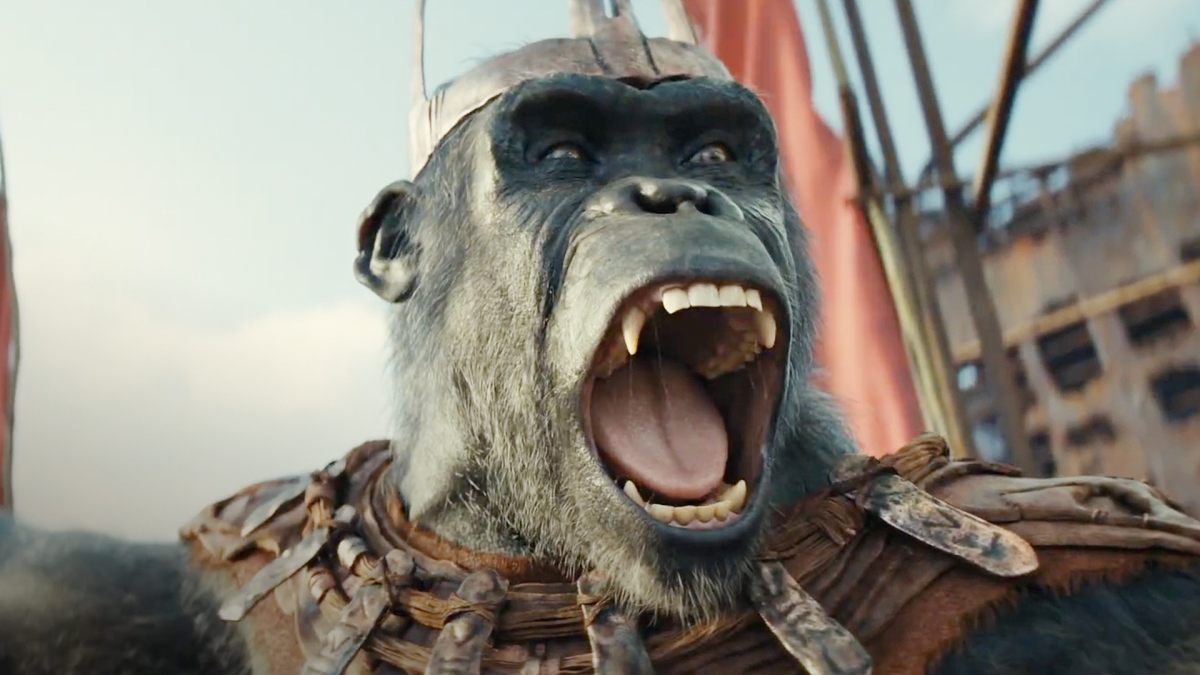
The Planet of the Apes movies have undergone one of the most astounding evolutions of any cinema franchise. For what started as a strange tale of man being ruled by apes, the saga has been revised in the 21st century to represent something grander about our relationship with nature and the dispute of technological progress and species dominance. Kingdom of the Planet of the Apes builds beautifully off the reboot trilogy and feels like a uniquely different film while still carrying that gritty Ape atmosphere.
The film takes place hundreds of years after the events of the previous film. With the apes leader Caesar long dead, his influence has faded as apes splinter into their own villages with their own customs and beliefs. Noa (Owen Teague) is a chimpanzee who resides among a tribe of eagle-raising villagers. Their speech is simplistic and they cannot read, but they function well enough with their sources of food and rites of passage. Noa’s desire to prove himself among his tribe and to his family are disrupted by two arrivals. There’s the mystery of a lurking human girl, Mei (Freya Allan), and the immediate threat of an invading force of apes led by Proximus Caesar (Kevin Durand). To save his clan, Noa must trek through the lush nature and decayed ruins of humanity, learning so much that it complicates his perspective on the world.
Throughout the film is a level of intrigue and mild-comedy that comes with the erosion of history over centuries. So much time has passed that the philosophy of Caesar and the history of humans have become lost to time, where Noa’s clan refers to humans as “echo.” The surviving truth remains within the words of the wise orangutan, Raka (Peter Macon). Although Raka is more well-spoken, literate, and can recall longer stretches of Earth’s history, there is still much left for him to learn. While speaking about humans with confidence, he still finds himself amazed at what they are capable of when meeting one. Raka may not recall of history accurate, but he does understand the gist of Caesar’s philosophy and can recognize when it’s being corrupted by someone like Proximus as an excuse for a monarchy.
There’s a lot of ground covered within Kingdom, but it all builds up with Noa’s journey instead of feeling like a meandering swirl of the man/ape debate. One of the earliest revelations that Noa comes to learn is that there was a time when man and ape lived side by side, a prospect that grows harder to believe with every step forward. While Raka speaks highly of co-existence, the relics of a children’s book about the zoo suggests otherwise. Even Mei is challenged with this idealism by the cynical surviving human Trevathan (William H. Macy), willing to accept his chains if it allows him to live in comfort.
On a surface level, the film is thrilling to watch on a massive screen for IMAX. The visual effects remain as robust as the previous Apes films, effortlessly meshing the life-like CGI apes with live-action characters within lush environments, ranging from the vibrancy of forests wrapping around cities to the harsh waters of a beach-side kingdom. The action is engrossing and emotional, where Noa’s many mountains involve him surviving the most vicious of beatings by the minions of Proximus. There’s even room for some tension-breaking charm, as when Mei inadvertently teaches the apes a curse word.
But those elements are mostly what audiences have come to expect with the heightened material of Planet of the Apes. What keeps the eyes locked on all the action is the grander philosophical implications that hold just as strongly. There’s some sweet moments of discovery, as when Noa peers into a telescope for the first time, striking him just as hard as the revelations of the past divulged by Raka. The road to survival is rocky as more discoveries of the dark history make the temporary between man and ape one filled with tension. There’s an ambiguity presented by the end that makes the film more enfatuating on an existential level, hitting more profoundly than one would expect for a summer blockbuster with talking apes.
Kingdom of the Planet of the Apes continues to showcase how there’s more left to explore in this franchise than improved visual effects. There’s plenty of action to satisfy those seeking the basic popcorn thrills of a bold VFX bursting from the screen, while the stellar writing meshes as the compositing. It’s a stellar union of quality thought-provoking fantasy and thrilling sequences with some absurdity served up on the side. The Apes movies remain strong together, proving that something more can be built from what director Matt Reeves left behind.

 “Deadpool & Wolverine” Review
“Deadpool & Wolverine” Review  “The Boys: Season Four” Review
“The Boys: Season Four” Review  “The American Society of Magical Negroes” Review
“The American Society of Magical Negroes” Review  “Twisters” Review
“Twisters” Review  “Sausage Party: Foodtopia” Review
“Sausage Party: Foodtopia” Review  “Robot Dreams” Review
“Robot Dreams” Review  “Godzilla x Kong: The New Empire” Review
“Godzilla x Kong: The New Empire” Review  “Slave Play. Not a Movie. A Play.” Review
“Slave Play. Not a Movie. A Play.” Review 



